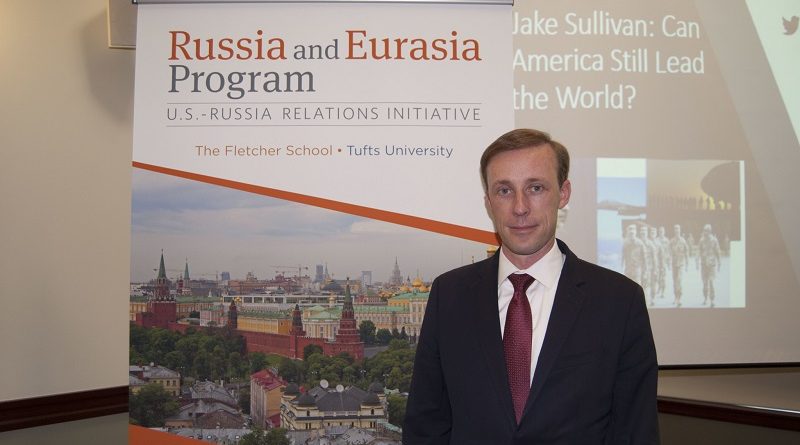Can America Still Lead the World? Fletcher’s Russia and Eurasia Program Welcomes American Policymaker Jake Sullivan
Can America still lead the world? Should it? And if so, how? These are the three questions American policymaker, Jake Sullivan, posed to Fletcher students on a recent visit to campus. Having served in the Obama administration as a national security advisor to Vice President Joe Biden and as director of policy planning at the U.S. Department of State, as well as having served as deputy chief of staff to Secretary of State Hillary Clinton and as senior policy advisor on her 2016 presidential campaign, Sullivan is uniquely positioned to recognize the ways that fundamental assumptions about American foreign policy are being challenged by President Donald Trump and his administration.
To begin the discussion America’s current and future approach to foreign policy, Sullivan explained that following the Cold War, there was an assumption that the United States was and would remain a global leader. “The U.S. was thought of as a constant while everything else was a variable,” said Sullivan. “Now, the ultimate variable in global affairs today is the United States of America. The most disruptive force right now because of Donald Trump, is changing the approach the U.S. is taking on foreign policy.”
Trump’s “America First” foreign policy spin contrasts the “United States as the indispensable nation” mentality of the last fifty years. Sullivan paraphrased President Trump when he said, “You’re indispensable to someone else, not yourself.” Or in other words, foreign policy designed to support other nations is by definition not working in America’s best interest.
Sullivan asserted that President Trump has attacked four key premises of American foreign policy which calls into question whether the U.S. can continue to lead. First, Trump doesn’t believe in alliances, especially those that were designed in the 1940s and ‘50s to push back the Soviet threat. Second, the President rejects positive-sum logic, “that the U.S. is better, safer, and stronger when other countries are better, safer, and stronger,” said Sullivan, feeling, instead, that other countries are reaping all of the benefits while America shoulders all of the burden. Third, the President believes that all relationships in global affairs should be strictly bilateral. Multilateral relationships like the European Union were designed to hamstring the U.S. Finally, President Trump approaches foreign policy with a different set of values. “He likes authoritarians, he’s comfortable with them, they are predictable, and he sort of wants to be like them,” said Sullivan.Twenty-seven years after the Cold War, American foreign policy remains undefined in Sullivan’s eyes. And as we face threats from states like the axis of authoritarianism as well as cross-border threats like climate change, weapons of mass destruction, cyber-attacks, pandemic disease, and global financial collapse, Sullivan sees an opportunity for America to be the architect of cooperation. “The rub about all of these [threats] is that none of them can be solved by one country acting alone and if the US is not playing a central role in organizing cooperation, it is hard to see how someone else can do it,” said Sullivan. “We need a player with sufficient power and leverage to gather relevant decision makers and drive results.”
Sullivan equated Trump’s approach to foreign policy to a hurricane. “He has swept through and demolished some of the core institutions and infrastructure of US foreign policy.” But he reminded the audience that in the aftermath of a hurricane, mayors don’t look to replace old infrastructure but instead to rebuild different, newer, and better infrastructure that is designed for the future. Post-Trump in two or six years, Sullivan invited Fletcher students to join him and be part of the effort to design the architecture of cooperation.
“In the absence of another actor who is prepared to step in and serve this role,” said Sullivan, “and believing, as I do, that it doesn’t happen without an actor, I would say that the United States for its own selfish national interest reasons, as well as for its contribution to the larger common interest, has to think very seriously about continuing to seek to play this leadership role.” Should the U.S. continue to lead? The early answer is yes.
[fshow username=FletcherRussia photosetid=72157704226911184 width=”800″ height=”534″]
This piece was republished from The Fletcher School website.

